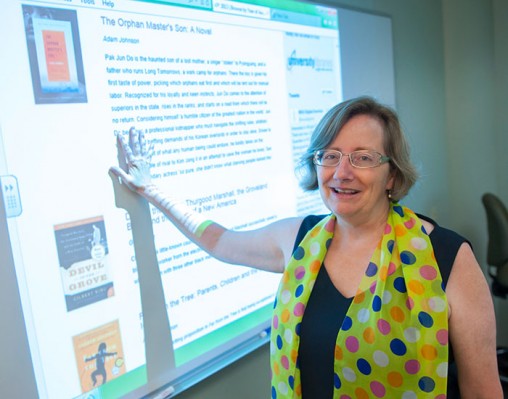
Carol Loranger, chair of the Department of English Languages and Literatures, created online bibliographies of the winners of the Dayton Literary Peace Prize.
It all began in her head with a mental list of those books you stack on your nightstand and can’t wait to read.
Two years later, the chair of the College of Liberal Arts’ Department of English Languages and Literatures had created a website brimming with information on the winners of the Dayton Literary Peace Prize and their works.
“It’s a reader’s bibliography,” said Carol Loranger, Ph.D. “The audience is people who are interested in peace and literature.”
Inaugurated in 2006, the Dayton Literary Peace Prize is the only annual U.S. literary award recognizing the power of the written word to promote peace. It honors adult fiction and nonfiction books that lead readers to a better understanding of other cultures, peoples, religions and political points of view.
Wright State has been heavily involved with the peace prize. The English department is a supporter, helping plan events surrounding the annual awarding of the prizes and sponsoring authors who come to campus to meet with creative-writing students and give public readings.
Loranger serves on the peace prize steering committee and the selection committee for the Holbrooke Distinguished Achievement Award.
Loranger says the peace prize began as a homegrown effort by very serious individuals to have an impact on international affairs by getting people to think about the world beyond themselves.
“Literature that causes us to think about the impact of violence on others and the potential for nonviolent solutions brings that whole other dimension,” she said. “It’s powerful, hard stuff sometimes.”
Loranger tries to read all the books that win and always wants to read more by an author she especially admires. So she began making a list of the winning authors and all of their works.
“It got me to thinking that readers who were interested in these peace prize books — a pretty big community now — might also appreciate having this information,” she said. “I had pages and pages of lists.”
So Loranger worked with Wright State Libraries to produce a searchable online database of peace prize winners and runners-up. She wrote the introduction, a brief history of the peace prize and instructions on how to use the website.
To do the bibliographies, Loranger relied on library card catalogs, author and publisher websites and Wikipedia. And she will update it every year with the new honorees and new book-length titles from former honorees.
Clicking on award type or year and the author’s name leads to a list and description of all of his or her book-length works, pictures of the book covers, the closest library that has the book and a link that enables purchase of the book.
“The Literary Peace Prize people are very pleased with it,” Loranger said. “They put it on their website right away and linked to it.”
She said the bibliographic website will be helpful to people interested in the development of contemporary literature as well as scholars doing academic studies of literary prizes or writing a history of the Dayton Literary Peace Prize.
“And there could be an audience who might be interested in prizes and their impact on peace or the impact on the prize-winning writer,” she said.
Visit the Dayton Literary Peace Prize Cumulative Bibliography website >>

 Glowing grad
Glowing grad  Wright State’s Homecoming Week features block party-inspired events Feb. 4–7 on the Dayton Campus
Wright State’s Homecoming Week features block party-inspired events Feb. 4–7 on the Dayton Campus  Wright State music professor honored with Ohio’s top music education service award
Wright State music professor honored with Ohio’s top music education service award  Wright State’s Industrial and Human Factors Engineering program named one of top online graduate programs by U.S. News
Wright State’s Industrial and Human Factors Engineering program named one of top online graduate programs by U.S. News  Student-run ReyRey Café celebrates decade of entrepreneurship at Wright State
Student-run ReyRey Café celebrates decade of entrepreneurship at Wright State 